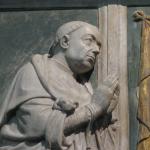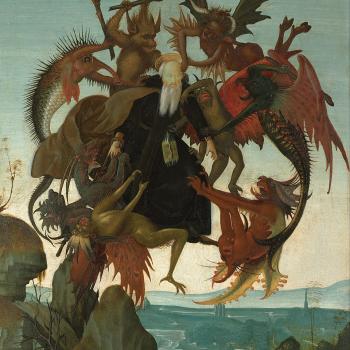
God needs nothing from us; the divine nature is unchangeably perfect. All the qualities we associate with God, qualities such as wisdom, goodness, truth, and love, all of them are expressions or energies of God’s simple, eternal perfection. God’s actions, God’s energies, are eternal, though we relate to them in derivative forms through our temporal engagement of them, experiencing them as if they were active in time, and therefore changeable due to the progression of time. All that happens in time for God is a part of God’s eternal activity, an activity which shows us who and what God is, though for us, what God does seems to be temporal, because we apprehend God’s activity in and through God’s relationship with temporal creation. We find, moreover, the one act is experienced to us as if they are many, varied acts. We logically distinguish them, though we must realize they are ultimately united together as one. The act of creation is one of many such activities. While we can ask questions such as what God was doing before creation, they show our imperfect understanding of God and lead us astray, as they make us think of God in temporal terms. In reality, for God, there is no “before creation.” All that exists in creation, thanks to God’s creative act, is a part of God’s one eternal creative act, and as it is eternally a part of God’s creative act, for God there is nothing other than that one act. But we can still appreciate the question, because we are still trying to understand why God creates. The relationship between the various actions, the various energies of God, can help us understand this to some degree. They work together as one. One of those actions is God’s love. It is one with God’s creative activity, and so, we can say , God’s creative act is one with God’s love in such a way that creation is made in and through God’s love. Thus, the anonymous author of the Armenian Oft-Repeated Discourses uses love to explain why God acts as a creator:
For the love of creation compelled the Creator to make all creatures, seen and unseen. He did not make them for the needs of the Deity but ‘for his glory to be revealed, to be understood through the things that are made visible” (Rom 1.20) to the incorporeal and corporeal beings. [1]
God’s love is eternal, and so all created, temporal things, are loved in that eternal love. It is in this light we can and should understand the author of the Oft-Repeated Discourses when he said that God’s love compelled God to create. God’s love for creation is an eternal love; for that love to be real, and not delusional, God had to create, so that what God loves eternally has a reality or existence of its own. What God creates is loved by God, and what God loves, is created by God, in one and the same act.
What is important for us is the realization that the greatness of God’s love makes God act for us, not because God needs us in an ontological sense, but because God’s greatness is so great that God is love, and through that love, makes the bounty of the divine nature communicable, capable of being engaged and united with an other which is not God. When we say God does not need us we must take it to mean that God does not need us to love, worship, or do anything for God in order for God to be all that God is. If we don’t love God, God is not diminished. If we don’t worship God, God certainly is not diminished. If we don’t do pious acts in the world, God is unharmed. If we blaspheme, God remains unmoved. But this does not mean our love is worthless. Love is greatest when it is met and united with another’s love. God’s love is the greatest love because it acts in such a way that it has established creation as an other to share that love, to give love back. And as creation does give such love back, the greatness of God, which cannot be harmed, paradoxically contains with it our love, even if our love is temporal and created in nature.
When we worship God, when we “do something for God’s sake,” we must not think we are making God better or greater by our actions. We are not. What we are doing, though, through our acts of love, such as worship, is open ourselves up to God so that we can unite ourselves with God and participate in and experience the bounty of the divine nature for ourselves. Our worship is meant to transform us, to make us better, to make us more like God. As God is love and opens up to others through that love (by the act of creation), the more we become like God, the more we will open ourselves up to others to love them, to share with them our love. The transformation which takes place in us, thanks to our acts of love, is something which we should appreciate and support. When we see the gift of love God has given to us grows, we should do what we can to preserve it.
When we see ourselves growing in love, growing in love towards others, thanks to our love for God and the way we worship God with love, we will find our engagement with God changing. We will not let the gifts we gained from our love be lost. We will not let ourselves be swayed by a purely legalistic, ritualistic, viewpoint, acting as we must engage ritual for the sake of ritual (and God). We must come to understand that the point of religious ritual, what makes it a good, when it is good, is that it helps transform us, making us greater than we were before we engaged it. But we must understand that this makes such worship a tool, and we must not confuse the tool as being the goal. When we find ourselves transformed, when we find God’s love for us truly has gifted us with love so that we become more and more like God, loving all as a result, we should not dismiss that gift, even if some think we have lost the way when we engage it more than the tools we used to attain it. The Sabbath, and with it, all forms of worship, all spiritual disciplines, were made for us so that we can gain the gifts which God desires us to have. When we have them, sometimes, the disciplines we used should no longer hold as much sway over us (just as if we used a raft to cross a body of water to some far away shore, once we attained that shore, we will not use the raft any more, because if we did, we would go nowhere, so discipline, once it has given us all it can give, is no longer necessary and might hinder us from further spiritual developments). St. Macarius the Great understood this; his long service to God, done with the right spirit, the spirit of love, had him engage all kinds of disciplines. They were useful up to a point. Once he attained what he sought, he did not want to lose what he gained. He found himself loving the time he had with others, because it meant, he was able to love them and appreciate them, and be in communion with them. He didn’t want to lose that gift, and that meant, he had to engage it when he had the chance:
He also said that when Abba Macarius received all the brethren in simplicity, some of them asked him why he mixed with them like this. He replied, ‘For twelve years I served the Lord, so that he might grant me this gift, and do you all advise me to give it up?’[2]
In our spiritual journey, we should be on the move, developing ourselves; after every proper development, we should not look back, seeing what we used to do and think we must repeat what we did to continue our development. St. Macarius gained the gift of love, and with it, he found the need to be with others, similar to the way God, through love, was “compelled” to create creation in order to share the bounty of divine love. If we need to use a specific discipline, a specific spiritual tool, to help us, such as using a bridge to cross over a river, we should use it, but once we have used it, it can become an obstruction if try to use it again (indeed, it might have us go backwards if we use it again, as would be the case if we were to use some bridge to cross over an obstacle and then decide to use it once again, for the only place that bridge could take us is to where we first came from). St. Macarius understood the gift given to him, and with it, he understood that he was to have a new way of life, one which was much more socially engaged; and that, of course, is to be expected by those who walk with God, for the more they walk with God, the more they will reflect God, the God who is revealed to be love in part by the way God works with creation.
[1] Moralia et Ascetica Armeniaca: The Oft-Repeated Discourses. Trans. Abraham Terian (Washington, DC: CUA Press, 2021), 65 [Discourse 2].
[2] The Sayings of the Desert Fathers. trans. Benedicta Ward (Kalamazoo, MI: Cistercian Publications, 1984), 129 [Saying of Abba Macarius the Great 9].
Stay in touch! Like A Little Bit of Nothing on Facebook.
If you liked what you read, please consider sharing it with your friends and family!













